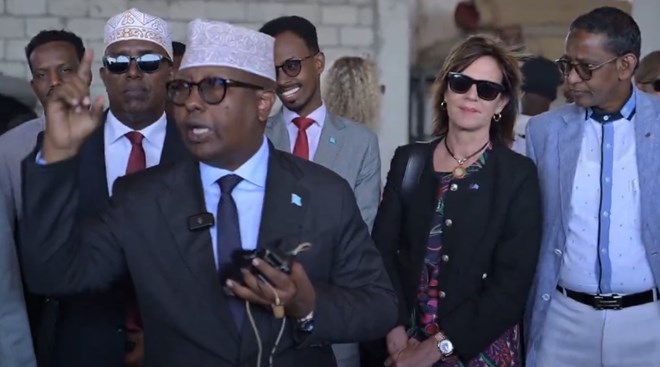
Friday December 6, 2024

Somalia's Minister of Foreign Affairs, Ahmed Mohamud Fiqi, addresses the press following the repatriation of 161 Somali migrants from Libya, highlighting the government's efforts to combat human trafficking and support returnees in rebuilding their lives. CREDIT/ MoFA Somalia
Mogadishu (HOL) — Somalia has launched a campaign against human trafficking, repatriating 161 of its citizens stranded in Libya. In a coordinated effort with international allies, including the European Union, the International Organization for Migration (IOM), and the UN Refugee Agency (UNHCR), the government brought the migrants home to Mogadishu and Hargeisa on Thursday.
Among the returnees were over 50 women and several mothers carrying young children—symbols of the human cost of migration. For some, like the young man recovering from a gunshot wound inflicted by traffickers, the journey home is both a relief and a reminder of unimaginable suffering.
Welcoming the returnees at Mogadishu's Aden Adde International Airport, Foreign Minister Ahmed Mohamud Fiqi issued a call to action. "We need the public's help in identifying these traffickers. They will be brought to justice," he declared.
Fiqi commended Somalia's embassy in Libya for its critical role and thanked the European Union for its financial backing. He also urged young people to stay in Somalia, promising government support. "In six months, we will have job opportunities ready for these returnees," he said, outlining plans overseen by the Ministry of Displacement and the President's Office.
"We are not merely returning these individuals. We are committed to supporting them in rebuilding their lives," said Maryan Yassin Haji Yusuf, Somalia's Special Envoy for Migration, Refugees, and Children's Rights. Her team, working with IOM, ensures that migrants receive medical care, family reunification, and other essential services.
IOM Chief of Mission in Somalia Manuel Marques Pereira said the UN migration agency is committed to the safety and well-being of all migrants moving through voluntary humanitarian returns.
"Our partnership with Somalia and the EU has already allowed us to assist 600 Somali migrants stranded in Libya. In the coming months, we will assist hundreds more returning from Libya through this partnership," Pereira added.
The stories of those repatriated are as diverse as they are harrowing. Migrants often face abuse at the hands of traffickers or endure gruelling detentions in Libyan facilities. Yusuf highlighted the particularly severe challenges for women and children. "Their suffering defies words," she said.
The dangers vary depending on where their journeys begin. "Routes through Bani Walid or Kufra present vastly different risks, but none are safe," Yusuf explained, referencing notorious trafficking hubs in Libya.
For the families of migrants, the cost of illegal migration extends beyond financial burdens. Many are forced to sell assets or take on debt to pay ransoms demanded by traffickers. The human toll is immense, leaving scars long after migrants return.
Yet, in their homecoming lies hope. "Living in Libya made me realize the value of having a homeland," said one returnee, who spent seven years in the North African nation. His gratitude underscores the Somali government's determination to provide alternatives to risky migration.
The operation is part of Somalia's nine-year effort to bring home its citizens from dangerous conditions abroad. Yusuf confirmed plans to repatriate 170 more individuals this month, with documentation already underway in Tripoli.
Somalia's reach extends beyond Libya. The government is actively identifying citizens stranded in Syria, Madagascar, and elsewhere, seeking to provide them a path back home.
Thursday's repatriation marks the second large-scale return from Libya this year, following similar operations in May and October. Somalia's commitment to addressing the root causes of illegal migration is clear: job creation, accountability for traffickers, and sustained collaboration with international partners.